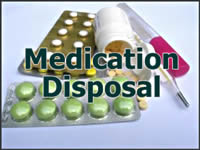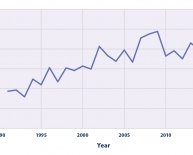
Illinois Environmental Protection Agency

Environmentally Safe Disposal of Pharmaceuticals
The Illinois Environmental Protection Agency has launched an initiative in collaboration with partners in both the private and public sector to promote environmentally responsible disposal of unwanted and expired medications.
Under a pilot program, IEPA has worked with several communities across the state, including county health departments, other local governments and pharmacies to provide expanded opportunities for collecting or dropping off pharmaceutical and personal care products.
The Agency also has done sampling of several public water supplies across the state for a variety of pharmaceuticals. While there currently is no evidence of any imminent human health threat concern, there is a growing concern about the impact on aquatic life and habitat. In addition, with the aging of the large baby boom generation and overall increase in the use of medications, it is important to keep these medications out of our water supplies.
On Oct. 1, 2008, Illinois EPA sponsored a “Meds with Water, Not in Water” Summit Conference in which more than 100 representatives from organizations ranging from the pharmaceutical manufacturing and distribution industry, to healthcare providers, law enforcement agencies, drinking water and wastewater treatment agencies, educators and local and state government met to brainstorm on this issue.
The coalitions that emerged from this summit have a two-pronged action objective. The first is to educate the public, through distribution of posters, fact sheets and pamphlets, about proper disposal methods, particularly to discourage the traditional method of flushing pills down the toilet or the drain. The second action objective is to establish a greatly expanded network of secure pharmaceutical collection centers throughout the state. A Medication Education Disposal Solutions (MEDS) Action Committee has been formed as a follow-up to the Summit to work on these objectives.
This IEPA web page is intended to consolidate fact sheets, collection options, useful partner links and other information on the disposal of medications.
With your help we can make Illinois a national leader in reducing the amount of discarded medications entering our rivers and lakes that may otherwise ultimately impact our drinking water supplies and aquatic ecosystems.
Safe Disposal of Medical Sharps
The handling and disposal of used home-generated medical sharps such as needles, syringes, and lancets, are exempted from regulation in Illinois’ Potentially Infectious Medical Waste law. However, these materials still need to be handled safely. Illinois EPA needs your help in ensuring that medical sharps are disposed of in a manner that minimizes health risks to haulers, recycling and landfill personnel and the community.
Medical sharps should be placed in either a purchased medical sharps container (from a pharmacy or health care provider) or a heavy-plastic or metal container. The containers should be puncture-proof with a tight-fitting lid. Household containers such as plastic detergent bottles can be used if the following precautions are observed:
- Use heavy-duty tape such as electrical or duct tape to secure the lid to the container.
- Write the words "Do Not Recycle" on the container with a black permanent marker. This helps to ensure the container will not be inadvertently mingled with recyclable materials.
- Double-bag the container in a couple of plastic shopping bags (i.e. grocery store bags) once the lid has been taped and the container has been marked.
- Do not use a clear or glass container.
- Do not over-stuff the containers with medical sharps (fill only to approximately full). This can increase pressure on the lid and cause a release of the medical sharps.
While waiting for a full container, keep out of reach of children and pets. Always wash your hands after touching medical sharps. Although other methods of disposal are preferred, the container may be placed in your regular trash for disposal once you have followed the precautions mentioned above.






















